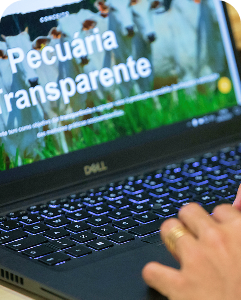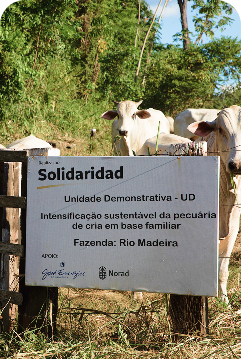Sustainability
Our Sustainability Strategy and Approach
We pursue excellence in all that we do, innovating to place high-quality food on the tables of millions of consumers around the world, and doing our part to preserve the planet’s resources for future generations. With a global, diversified food platform, and a portfolio of value-added and branded products, we aspire to be a model for profitable and sustainable food production for a growing planet – while also serving as agents for positive change in the communities where we operate.

At JBS, we are striving to set the food industry standard for profitable and sustainable food production for a growing planet. This means improving the sustainable performance and resiliency of not only our own operations but contributing to the enhanced sustainability of the greater food production system as a whole, while also helping our customers achieve their sustainability goals.
To realize this vision, our Global Sustainability Strategy mirrors our supply chain connections and addresses our material sustainability topics. This strategy will guide the company’s actions across environmental, social, and governance topics and serve as the overarching framework through which all our sustainability programs and initiatives are developed.
JBS Sustainability Strategies Across Our Value Chain
Assist farmers with stewarding natural resources and enhacing productivity
Focus areas
Climate, Land, Biodiversity
Examples
Soil Health Habitat & Water Management, Manure-to-RNG Digestors; On-Farm Solar Energy; Feed Additive Trials; etc.
Source responsibly produced agricultural commodities
Focus areas
Commodity Supply Chains, Deforestation, Human Rights, Animal Welfare
Examples
Farm Assurance Programs; Compliance Monitoring Mechanisms; Consulting Services; Human Rights Assessments; etc.
Produce sustainable food
Focus areas
Operational Excellence, Circular Economy, Packaging, Customer and Consumer Engagement, Product Integrity
Examples
LED Lighting; 3rd-Party Animal Welfare Audits; Anaerobic Lagoons; AI & Robotics; Tallow-to-Biofuels; etc.
Strengthen food systems and communities
Focus areas
Food Supply Chain, Food Waste, Food Security, Community Impact, Industry Collaboration
Examples
Nutritional Food; Community Awareness; Free Education; Recyclable Packaging; Eco-Friendly Transportation; etc.
Operate responsibly
Focus areas
Ethics and Compliance, Team Management, Human Rights, Employee Engagement, Team Member Health and Safety, Diversity and Inclusion
Examples
Board Oversight; Safety Protocols; Anonymous Grievance Mechanisms; E/Ex Programs; Leadership Development; etc.
Key focus areas
Climate Change
Climate change and food security are two seemingly competing challenges — feeding a future world of 10 billion people with safe, nutritious, affordable food while also helping farmers and our food system reduce environmental impacts and adapt to a changing climate.
JBS believes we must collectively act with urgency to limit global warming and help producers adapt to its most negative effects. As a global, diversified food company, we have a responsibility to leverage our scale and influence to help lead sustainable transformation by example and empower our value chain and peers to collectively move forward. Through partnerships with governments, academia, industry associations, and others, we are working to innovate and impact one of the most pressing long-term risks facing the agricultural supply chain and dependent industries.
JBS has more than a decade-long history of measuring, monitoring, and reporting direct and indirect greenhouse gas (GHG) emissions and of voluntarily reporting to CDP, regional regulatory frameworks, and others. Our GHG emissions are calculated based on the World Resources Institute’s and the World Business Council for Sustainable Development’s The Greenhouse Gas Protocol: A Corporate Accounting and Reporting Standard (Revised Edition) (GHG Protocol), as well as internal criteria defined by JBS.
To strengthen stakeholder confidence in our reported emissions, JBS has obtained third-party assurances for our global scope 1, scope 2, and scope 3 GHG inventories.
Our Approach: At JBS, we believe everyone must do their part to address the impacts of climate change, and the responsibility to address the agricultural system’s footprint cannot be put on individual farmers alone. Our company is well-positioned to engage our suppliers, food system partners, and consumers on how to collectively address our shared GHG emissions and improve the resiliency and productivity of the global food system.
Our company culture has always promoted on-the-ground collaboration over off-site enforcement, and we strive to achieve our ambition to improve the resiliency of our food system to climate change through collaborative initiatives that improve both the environmental and financial performance of our supplier partners. At JBS, we will prioritize key areas to strengthen climate resilience, promoting sustainable, productive value chains that support global food security.
Environmental Performance
Around the world, JBS operations are working to improve the efficiency of production, while optimizing our use of natural resources and to limit our overall environmental footprint.
JBS operations are dedicated to improving on-site energy efficiency and increasing the use of
both direct and indirect energy from renewable sources. To reduce energy use in our facilities, our
environmental and engineering teams are dedicated to identifying operational efficiencies, replacing equipment, and leading behavioral improvements. JBS also invests in capital improvements to further enhance our energy efficiency and, increasingly, generate on-site renewable sources of gas and electricity through waste-to-energy infrastructure projects.
Water stewardship is crucial to the resilience of our global community and business operations. Water is a critical component in the production of safe, high-quality food. Within our operations, we embrace our responsibility to decrease water use by monitoring withdrawal and usage and prioritizing reductions, while still preserving our high standards for food safety and sanitary conditions.
At JBS, we believe that people and planet should not be at odds. For us, becoming people and planet positive means that agricultural food systems are inextricably linked to the protection and restoration of our shared natural resources. That’s why JBS is undertaking a comprehensive approach toward addressing the drivers of deforestation while also positively supporting livestock producers and the tens of thousands of farm families we depend upon to produce food. JBS has a five-pronged approach to combating potential deforestation in our supply chain that is centered on:
Circular Economy Solutions
We apply strategic, circular-economy concepts across our operations to reduce, reuse, recover, and recycle materials and energy within closed loop systems and minimize disposal and waste. Doing so not only creates new business opportunities for our company, but also disruptive solutions that support our operational continuity into the future.
Over the last two decades, JBS has implemented a number of initiatives and launched new businesses to sustainably transform inedible byproducts produced in our operations into biodiesel, nutraceuticals, soaps, animal feed, and more. Packaging and organic waste generated during JBS processing is also transformed into new packaging for use at JBS operations and fertilizers for sale, respectively.
Animal Welfare
As leaders in animal protein production, we have a responsibility to provide our animals with a good quality of life and a humane end. Across our operations, we have embedded animal welfare practices that demonstrate our respect for the animals on which our business depends. We have aligned our policies, including the JBS Global Animal Welfare Policy, procedures with local laws and regulations, and internationally recognized standards, including the Five Domains Model, which is a framework for assessing animal welfare.
Across our operations, our approach to animal care is grounded in science, measurement, training, audits, and research. Dedicated teams oversee continuous training, facility assessments, monitoring, and compliance — all under a zero-tolerance policy for mistreatment.
Health & Safety
The health and safety of our team members is our priority. Our dedication begins with a culture of accountability, empowering each team member to understand and follow health and safety guidelines while staying vigilant.
We foster a culture of safety across all facilities, guided by our Global Health and Safety Policy, with continuous training and strict governance to protect every team member. Each year, JBS locations undergo a comprehensive safety management system audit, fleet safety audit, and occupational health audit based on applicable legislation and company procedures. These audits focus on early detection of risks and in-depth reviews of policies and programs related to preventing electrical safety issues, ergonomics weaknesses, falls and slips, and machine guarding issues.
JBS has integrated safety data across digital platforms to identify enterprise-wide trends and best practices related to health and safety. Data-driven insights support us to perform root-cause analysis and take corrective actions such as audits and safety inspections. Insights also help us to define best practices that we can share across the organization.
To learn more
To learn more about our sustainability initiatives, including our Management & Governance structure, please visit our JBS ESG website.
Visit JBS ESG website



